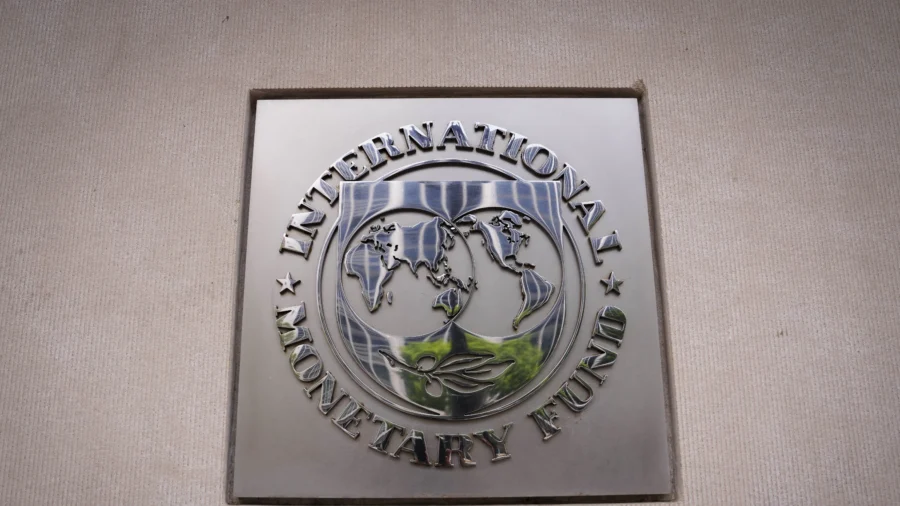The U.S. budget deficit poses a “significant risk” for global fiscal developments and outlooks, according to the International Monetary Fund (IMF).
In its latest Fiscal Monitor report, IMF economists stated that U.S. and Chinese fiscal policies produce “profound effects” on the worldwide economy and present challenges for baseline fiscal projections in advanced and developing economies.
IMF experts combed through last year’s numbers and reported that the U.S. government showcased “remarkably large fiscal slippages,” as the deficit climbed to 8.8 percent of the gross domestic product (GDP), up from 4.1 percent of GDP in 2022. Income tax revenues tumbled by 3.1 percentage points of GDP amid lower capital gains tax receipts and delayed tax payment deadlines. Federal spending rose by 1.3 percentage points of GDP. Looking ahead, the budget shortfall is projected to represent more than 6 percent of GDP.
The IMF noted that, due to higher interest rates, financing costs to service the national debt have ballooned.
The benchmark 10-year Treasury yield climbed to a 16-year high of 5 percent in October 2023. Despite receding in the subsequent months, across-the-board bond yields have dramatically risen again on expectations of higher-for-longer interest rates.
Inflationary pressures, which have been revived in the first quarter of 2024, could persist as fiscal policy affects nominal interest rates.
“Decomposing the drivers of core inflation empirically to parse the effects of fiscal shocks in the United States reveals that contributions from fiscal policy in cumulative terms remained statistically significant in 2023, at about 0.5 percentage point,” the Washington-based institute wrote.
In the end, the U.S. government maintaining loose fiscal policy “could make the last mile of disinflation harder to achieve while exacerbating the debt burden,” the global body added.
“Further, global interest rate spillovers could contribute to tighter financial conditions, increasing risks elsewhere.”
In a separate World Economic Outlook report, IMF chief economist Pierre-Olivier Gourinchas conceded that the present U.S. fiscal condition was “of particular concern” as it is “out of line with long-term fiscal sustainability. This could make the Federal Reserve’s job to restore price stability more challenging.
“It raises short-term risks to the disinflation process, as well as longer-term fiscal and financial stability risks for the global economy,” he stated. “Something will have to give.”
Digging Into US Finances
In the first six months of fiscal year 2024, the federal deficit has crossed the $1 trillion mark and is on track to reach $1.5 trillion.
Experts have warned about the long-term fiscal challenges Washington faces.
Last month, the non-partisan Congressional Budget Office (CBO) projected that the deficit would spike to 8.5 percent of GDP in 2054.
The budget watchdog predicted that outlays would account for 27.3 percent of the GDP by 2054, listing rising interest payments and spending for major health care programs, like Medicare, as the main drivers of the jump.
Federal outlays are seen climbing to 18.8 percent of GDP, fueled by higher income tax receipts. Today, nearly half of income tax revenues are allocated to servicing the debt.

“So far this year 39 cents of every dollar paid in individual income taxes is needed to simply pay interest on the national debt. That means we are paying for the past, not the future,” the Committee for a Responsible Federal Budget’s Tim Penny and David Minge said in a recent opinion piece for the Star Tribune.
As for the national debt, the CBO estimates it will reach 166 percent of GDP by 2054 “and remains on track to increase thereafter.”
“Such large and growing debt would slow economic growth, push up interest payments to foreign holders of U.S. debt, and pose significant risks to the fiscal and economic outlook; it could also cause lawmakers to feel more constrained in their policy choices,” according to the long-term budget outlook.
The national debt presently stands at $34.6 trillion, rising about $700 billion since the beginning of the year.
State of the Global Economy
The IMF projects the global economy to expand by 3.2 percent for the second consecutive year and anticipates world growth of 3.2 percent in 2025.
In the United States, real GDP is expected to increase by 1.7 percent in 2024 and 1.8 percent next year. Other advanced economies, such as the Euro area, Japan, and the United Kingdom, are forecast to record real GDP growth rates below 1 percent and rebound in 2025.
In emerging markets, India is predicted to lead the global economy by growing 6.8 percent in 2024 and 6.5 percent in 2025. China’s prospects are anticipated to trend downward, with real GDP growth rates of 4.6 percent in 2024 and 4.1 percent in 2025.
“Despite gloomy predictions, the global economy remains remarkably resilient, with steady growth and inflation slowing almost as quickly as it rose,’ Mr. Gourinchas wrote.
However, inflation risks remain because the latest progress toward inflation targets “has somewhat stalled” since the start of the year.
“This could be a temporary setback, but there are reasons to remain vigilant,” he noted, adding that rising crude oil prices and trade restrictions on Chinese exports could push up goods inflation.
Speaking during an interview with CNBC on April 16, the IMF economist stated that global recession risks are “fairly minimal.”
“At this point, it will take a lot to derail this economy. There has been tremendous resilience in terms of growth prospects,” Mr. Gourinchas told the business news network, alluding to strong economic performances by the United States and several emerging market economies and slowing inflation.
Gita Gopinath, the IMF’s deputy managing director, told CNBC that she is concerned about brewing geopolitical strife. While there has yet to be significant spillover from the Middle East, the risks are sizable, and if the conflict escalates and expands to the wider region, “the implications that could have for oil prices could be substantial,” he said.
Oil prices have risen as much as 20 percent year-to-date. Following Iran’s aerial assault on Israel, crude futures have eased, with the international benchmark Brent falling below $90 per barrel.
From The Epoch Times

